
Public Opinion Research Institute Corporation
October 22, 2015
Survey Overview
From August to September 2015, The Genron NPO and China
International Publishing Group conducted joint opinion polls targeting the
citizens of Japan and China. This is the 11th
annual opinion poll and the opinion poll has been jointly
conducted since 2005 when Japan-China relations were at their lowest level. The
objective of the survey is to continuously monitor the state of mutual
understanding and perceptions of the Japanese and Chinese public toward each
other, and their changes over time.
The opinion poll in Japan was conducted from September 4 to
28 under the placement (self-administered) method, targeting men and women over
the age of 18 (excluding high school students). The total number of valid
responses obtained was 1,000. The highest levels of educational attainment of
the respondents were as follows: up to junior high school diploma 8.8%, high
school diploma 46.5%, junior college/technical college diploma 17.6%,
bachelor's degree 23.0% and master's degree 2.0%.
The
opinion poll in China was conducted from August 21 to September 7, through the
interview method targeting men and women over the age of 18 in 10 cities:
Beijing, Shanghai, Guangzhou, Chengdu, Shenyang, Wuhan, Nanjing, Xian, Qingdao
and Zhengzhou. The number of total valid responses obtained was 1,570. The
highest levels of educational attainment of the respondents were as follows: up
to junior high school diploma 11.5%, high school/technical high school diploma
40.7%, technical college diploma 25.7%, bachelor's degree 20.8% and master's
degree 1.2%.
The
Genron NPO and China International Publishing Group also conducted separate
opinion polls targeting well-informed persons in both countries. The questions
contained were the same as in the public opinion poll targeting general public.
In the expert survey in Japan, questionnaires were sent to about 2,000 people
who have taken part in discussion events or surveys organized by The Genron
NPO. Among them were business leaders, academics, journalists and government
officials in Japan. Valid responses obtained were 627.. The highest levels of
educational attainment of the respondents were as follows: bachelor's degree
67.5% and master's degree 24.4%. Unlike general public, 79.9% of the respondents
have visited China and 76.4% of them have Chinese acquaintances to whom they
can converse with..
The
expert survey in China was based on a sample list generated from the Horizon
Research Consultancy Group panel data, including business leaders, government
officials, journalists, experts and public organization officials. The poll was
conducted between August 20 and September 24. Valid responses obtained were 400.
These samples were analyzed as views among well-informed people in China.

Impressions of Each Other's Country among Japanese and Chinese Public
The percentage of Japanese who has an "unfavorable" impression (including "relatively unfavorable") remain high but has lowered slightly to 88.8% when compared with the highest-ever figure of 93.0% from last year's survey.
Of the Chinese respondents, 78.3% express an "unfavorable" impression of Japan, falling below the 80% mark, down from last year's 86.8%. In comparison to 2013 when the "unfavorable" impression toward Japan marked its highest level (2013: 92.8%) since the beginning of the survey, in 2005, this year's figure shows 14-percentage-point improvement. As another noticeable finding, 21.4% of the Chinese respondents have a "favorable" impression (including "relatively favorable") of Japan, which is an increase of over 10 percentage points from 11.3% in 2014.
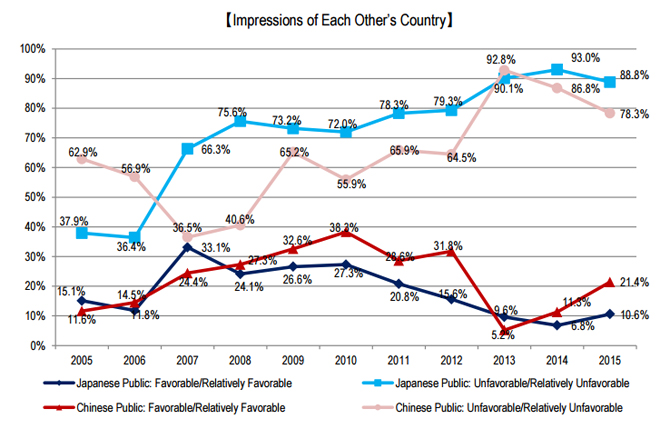
Reasons behind the Impressions of Each Other's Country
On the Japanese side, 35.8% (2014: 38.2%) of the respondents cite their interest in "China's traditional culture and history" as reasons for their favorable impression. This is the most frequently mentioned reason. Following this, 34.0% (2014: 39.7%) of the respondents mention that due to "direct interaction with Chinese people, particularly with Chinese students in Japan, they are becoming familiar" and it contributes to favorable impression of China.
As reasons for a favorable impression of Japan, 57.0% (2014: 52.6%) of the Chinese respondents mention that "Japanese are polite, and have good manners and high cultural standards." The second most frequently cited reason is that "Japanese are earnest, diligent and hard-working" with 47.2% (2014: 53.8%). Overall, satisfactory views of Japanese people's national character are behind their favorable impression of Japan. A significant increase can be seen in the reason "because of the remarkable economic growth," which has grown 17 percentage points to 36.8% from 19.7% last year.
The most frequently mentioned reason for an "unfavorable" impression of China among Japanese people is "criticism of Japan over historical issues," (55.1%, 2014: 52.2%). Second is the reason that "China's actions to secure resource, energy and food look selfish," (53.0%, 2014: 52.8%). These are the two reasons mentioned by the majority of Japanese respondents. The most frequently cited reason from last year's poll "China's actions are incompatible with international rules" came third with 47.9% (2014: 55.1%). The percentage of those who mentioned that "confrontation continues over the Senkaku Islands" fell to 46.4% (2014: 50.4%), showing thedecrease for the third consecutive year. A noticeable increase is seen in the reason "China's military buildup and non-transparency is evident," (31.2%, 2014: 39.2%).
As reasons for the unfavorable impression of Japan on the Chinese side, 70.5% of the Chinese respondents mention "Japan's lack of a proper apology and remorse over the history of invasion of China." This is the most frequently cited reason and increased of over 10 percentage points from 59.6% last year. "Japanese purchase of the Diaoyu Islands for the nation and fueling the confrontation" is cited by 68.1% (2014: 64.0%). These two reasons are prominent in comparison to other reasons, as was the case with last year's survey.
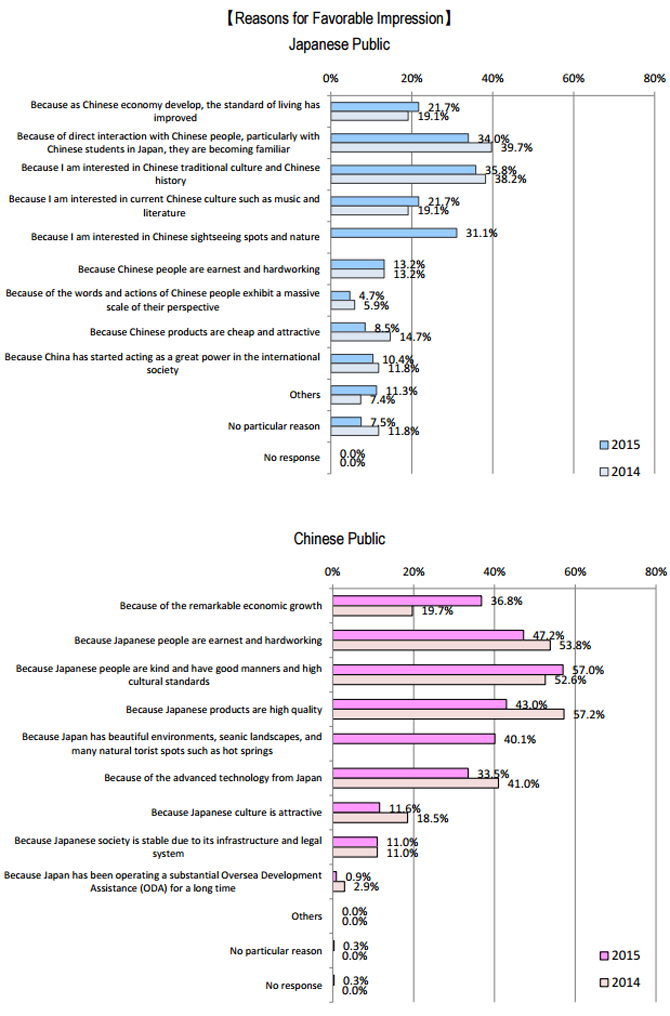
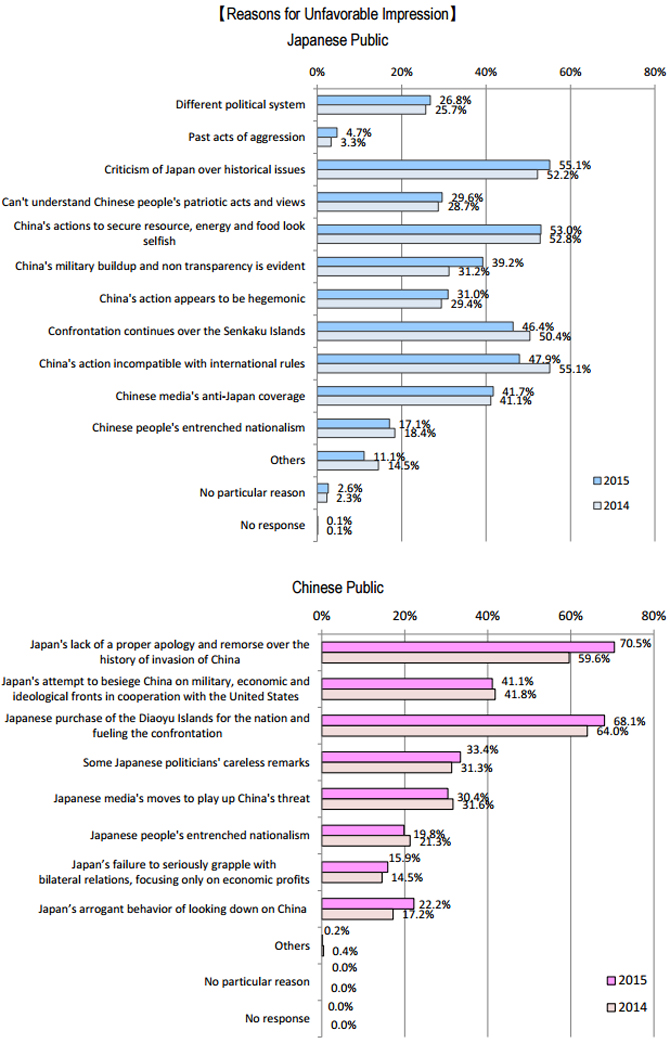
How the Japanese and Chinese people See the Current State of National Sentiments toward Each Other's Country
The percentage of Japanese who observed that "this is an undesirable situation and I have concerns" is 31.0% (2014: 32.5%) and "the situation is a problem and it needs to be resolved" is mentioned by 43.9% (2014: 46.9%). When combined, over 70% of Japanese indicates their concern over the current states of national sentiments between Japan and China.
On the Chinese side, 20.7% (2014: 35.2%) responded that "this is an undesirable situation and I have concerns." 34.9% (2014: 35.2%) of the Chinese respondents think that "the situation is a problem and it needs to be resolved". If combined, the majority of Chinese respondents see the situation as concerns while three in ten Chinese respondents see that "the situation is natural and it can be understood" (31.5%).
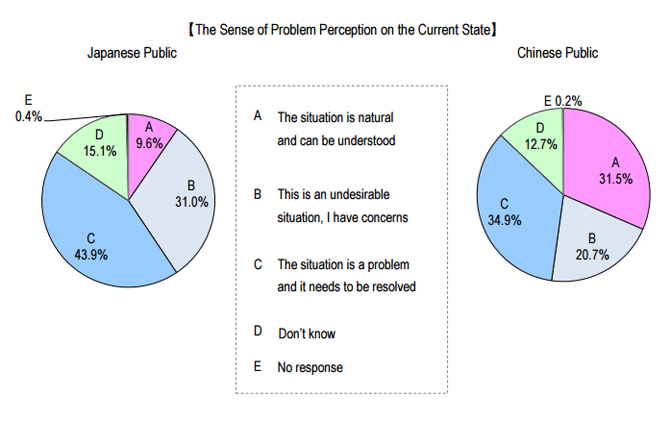

Matters Associated with Each Other's Country
On the question of "what comes to mind when you think of China," the most common answer among Japanese respondents was "air pollution" at 36.8%, as was the case with last year (2014: 41.2%) and the second was "Chinese cuisine," (33.7%, 2014: 34.0%). "The Senkaku/Diaoyu Islands" was down to 19.9% from 28.6% last year, slipping below 20%. This indicates that the issues relating to Senkaku is calming down in the Japanese national sentiment.
With regard to "what comes to mind when you think of Japan" on the part of Chinese respondents, the most frequently cited answer was the Senkaku/Diaoyu Islands at 50.6%, as was the case with last year (2014: 46.6%). "The Nanjing Massacre" came second most popular, which is also same as last year, but the percentage has grown sharply to 47.9% from 35.5% in 2014, indicating that the spotlight is again on the history-related issues for Chinese public. Nevertheless, increases can also be seen in answers, which have no political/historical implications, such as sakura (cherry blossoms) (35.0%, 2014: 28.2%).
When asked about "Chinese political leaders whom you know," Mao Zedong remains as the most common answer among Japanese respondents, with 90.1% (2014: 92.0%), showing that China's past political leaders are likely to be recognized by Japanese people. President Xi Jinping is known by 69.8% of the Japanese respondents, showing an increase of 11 percentage points from 58.8% in 2014.
With regard to "Japanese political leaders whom you know," Prime Minister Shinzo Abe is referred to by 83.6% of the Chinese respondents, up from 75.2% last year.
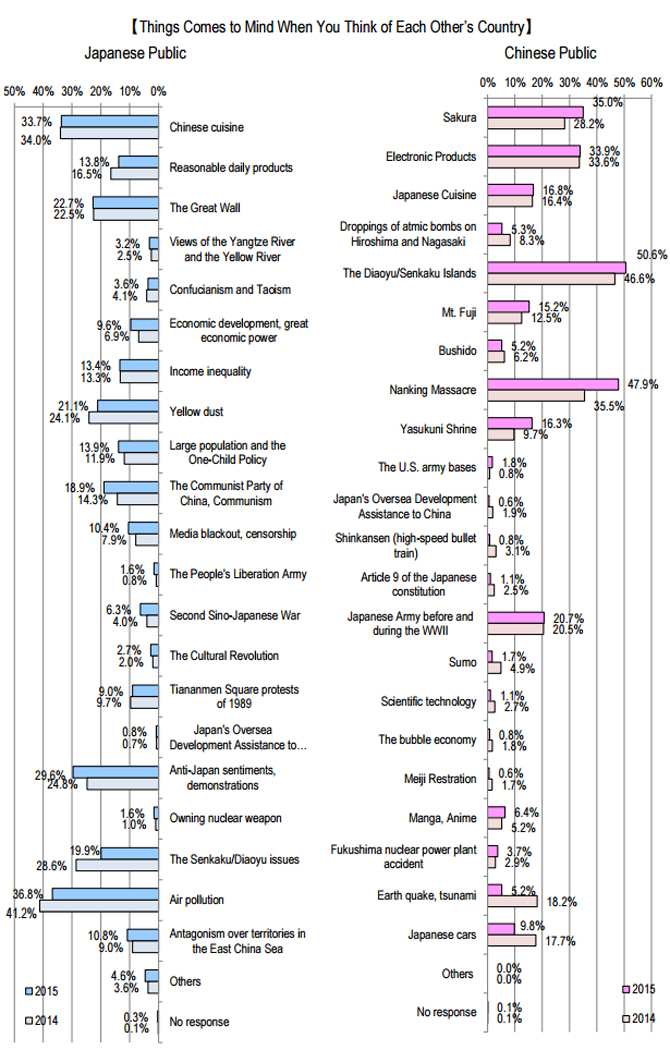
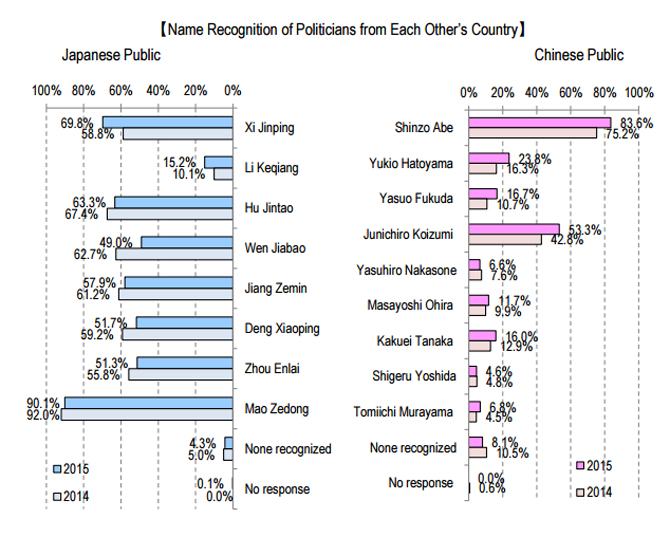
Perception of Social/Political Systems of Each Other's Country
Nearly 70% of the Japanese view the socio-political system of China to be socialism/communism (69.0%, 2014: 66.6%). This figure has been relatively consistent for the past 11 years; it has been cited by the large majority (at about 70%) in the past 10 surveys and has been the most common understanding of China among Japanese general public.
On the question of Japanese socio-political system, the most frequently cited answer by Chinese respondents is "militarism" (46.0%), showing a sharp increase by 10 percentage points and surpassing "capitalism," which was the most common understanding of Japanese society in last year's survey (42.9%, 2014: 39.7%). Fundamental principles, which Japan has upheld since the end of WWII, are cited by only a fraction of Chinese respondents. For example, "pacifism" is cited by only 9.2% (2014: 10.5%), "democracy" 13.1% (2014: 14.4%) and "the principle of international cooperation" 9.2% (2014: 6.7%).
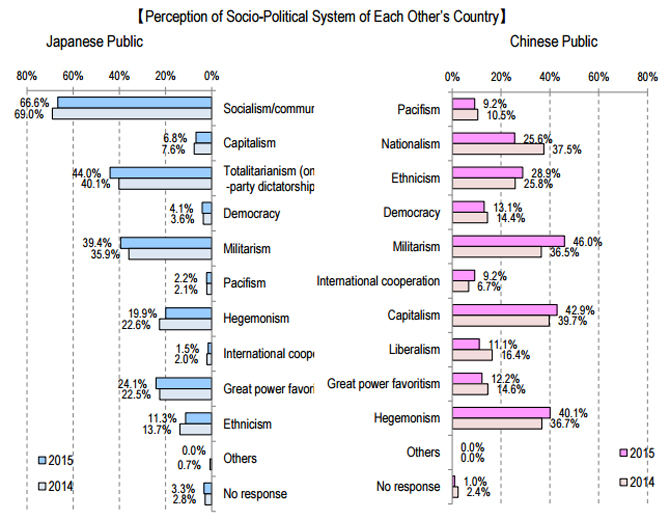

The Present and Future of Japan-China Relations
Japanese respondents who view present Japan-China relations as "bad" (including "relatively bad") was 71.9%, but this was a significant improvement of over 10 percentage points from 83.4% last year.
The view that the current bilateral relations are "bad" was expressed by 67.2% among Chinese respondents. This improved from the record high 90.3% in the 2013 survey, but the trend has not shown much improvement since last year.
For the future prospects of the Japan-China relations, the largest fraction of 42.5% (2014: 34.7%), among Japanese respondents is expecting the relationship between Japan and China will remain the same. But those who expect a "worsening" of the situations (including "relatively get worse") decreased sharply to 24.7% from 36.8% last year. Those who foresee an "improvement" in Japan-China relation grew to 12.7% from 8.0% last year. This indicates that optimism is emerging in the perception about the course of bilateral relations.
Of the Chinese respondents, those who expect "worsening" of bilateral relation decreased to 41.1% from 49.8% in the 2014 survey. However, there was no increase in those who expect the situation to improve, indicating that the Chinese are less confident than the Japanese that the bilateral relationship will improve steadily.
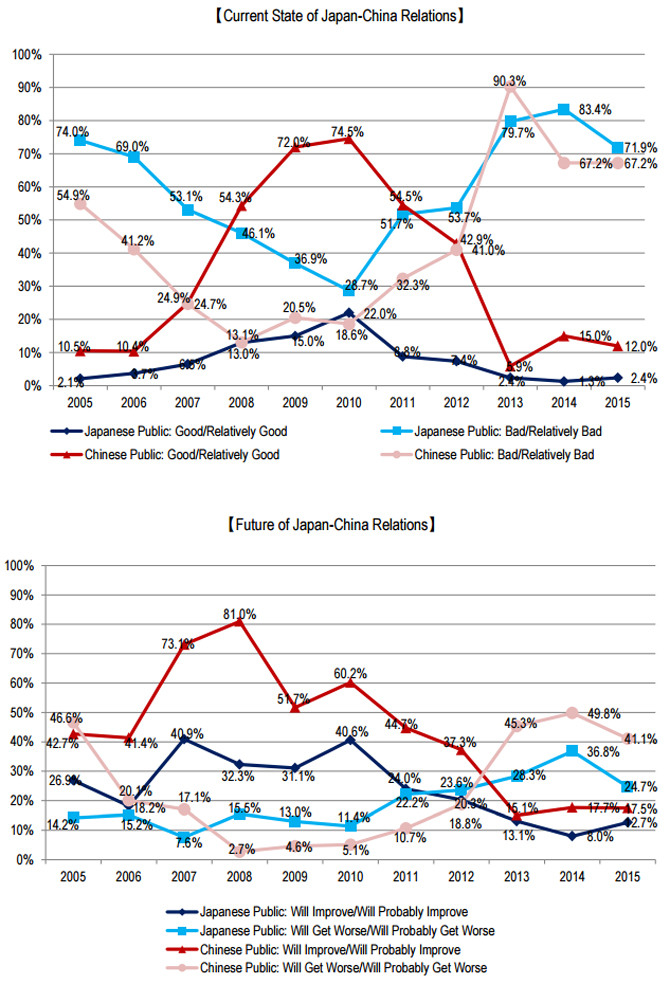
Obstacles to Development of Japan-China Relations
The biggest concern perceived by Japanese in Japan-China relations is "antagonism over territorial issues (the Senkaku/Diaoyu Islands)" (56.0%), as was the case with last year (2014; 58.6%). The second biggest concern was the lack of trust between the Japanese and Chinese governments (38.2%, 2014: 35.0%). A lack of trust between the two countries' peoples was mentioned by 25.9% (2014: 25.5%). Combined, more than 60% of the Japanese respondents see the lack of confidence between the governments and the peoples of the two countries as an obstacle to improving bilateral relations. The second most frequently cited answer in the 2014 survey "China's historical understanding and historical education," was mentioned by only 26.3% in this year's survey, which shows a sizable decline from 42.9% last year.
On the Chinese side, the largest percentage of respondents (66.4%, 2014: 64.8%) cited the "antagonism over the territorial issues" as a major obstacle, as was the case with last year. Similar to the findings from the Japanese opinion poll, more and more Chinese public are concerned about a lack of confidence between the two governments and peoples, and has been seen as obstacles to improving bilateral relations. When combined, more than 40% of the Chinese respondents see a lack of trust between the governments (25.5%, 2014: 25.4%) and between Japanese and Chinese people (20.8%, 2014: 15.5%) as problematic.
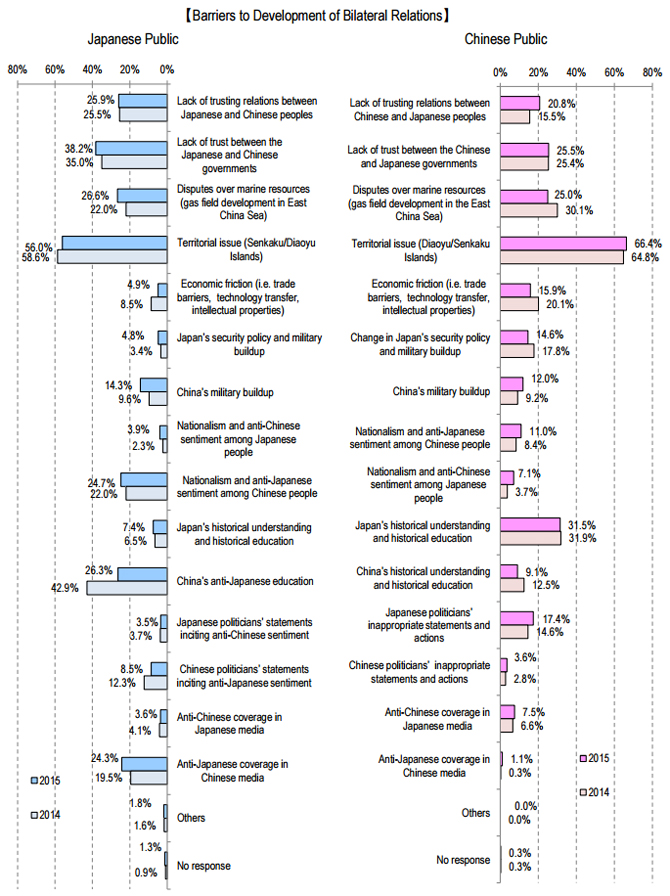
How is the Importance of Japan-China Relations Viewed?
Japanese respondents who believe that Japan-China relations are "important" (including "relatively important") increased from 70.6% last year to 74.4% and from 65.0% last year to 70.1% for Chinese respondents.
As reasons for the importance of Japan-China relations, the largest number, 58.5% (2014: 53.4%), among Japanese respondents think that because the two countries are important neighbors. The majority (55.2%, 2014: 55.8%) of Japanese respondents also believes that "the cooperation between Japan and China is indispensable to peace and prosperity in Asia." The findings indicate that the Japanese recognize the importance of bilateral relations from a practical point of view.
In contrast, a prominent 66.8% of the Chinese respondents mentioned that the two countries are important neighbors, an increase of over 20 percentage points from 45.5% for last year, indicating that their awareness about the importance of Japan-China relations remains as an understanding based on general facts.
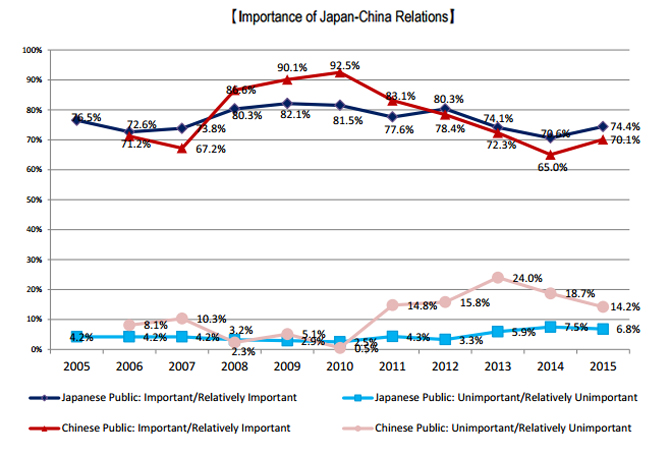
Effective Measures for Improving Japan-China Relations
The most common reply among Japanese respondents on effective measures for better Japan-China relations was the strengthening of political and security relations at 32.6%, which was followed by "promote cooperation on global issues" (19.1%).
For Chinese respondents, the most common reply was the "strengthening of economic relations" with 31.8%. Second was the "promotion of civil dialogue and cultural exchange" (22.4%).
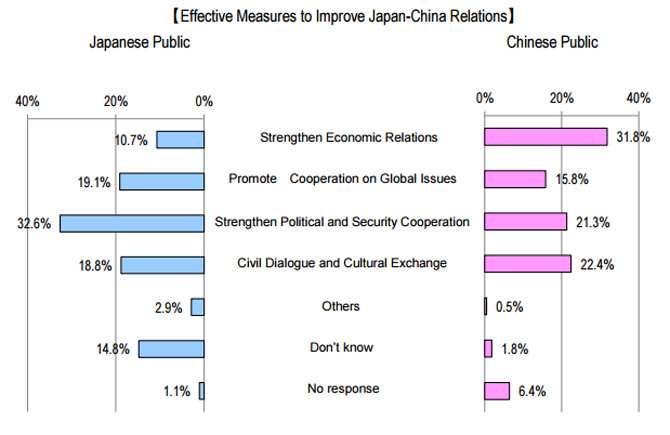

Importance of Relations with Japan/China In Comparison to Relations with the U.S. and Affinity toward Respective Countries
When the importance of Japan-China relations and Japan-U.S. relations are compared, 55.1% (2014: 50.1%) of Japanese respondents replied that both are equally important. Those who believe that Japan-U.S. relations are more important came to 34.4% (2014: 36.4%). But those who see Japan-China relations as more important accounted for only 3.1% (2014: 3.7%).
Of Chinese respondents, the largest number, 49.9%, replied that both relations are equally important, an increase of almost 10 percentage points from 40.3% in the 2014 survey. Following this, 22.8% (2014: 22.5%) of Chinese respondents replied that relations between China and the U.S. are more important. The percentage of those who believe Japan-China relations are more important came to 14.5%, down 8 percentage points from 22.0% last year.
As to affinity toward each other's country among Japanese and Chinese respondents, and affinity they feel toward the U.S., 53.5% (2014: 55.7%) of the Japanese respondents felt a greater affinity toward the U.S. 49.6% of the Chinese respondents felt no affinity toward either Japan or the U.S.,(2014: 44.4%). The percentage of Japanese and Chinese respondents who feel affinity toward each other's country remained below 10% on both sides, 4.4% (2014: 5.6%) among the Japanese and 6.1% (2014: 4.4%).among the Chinese
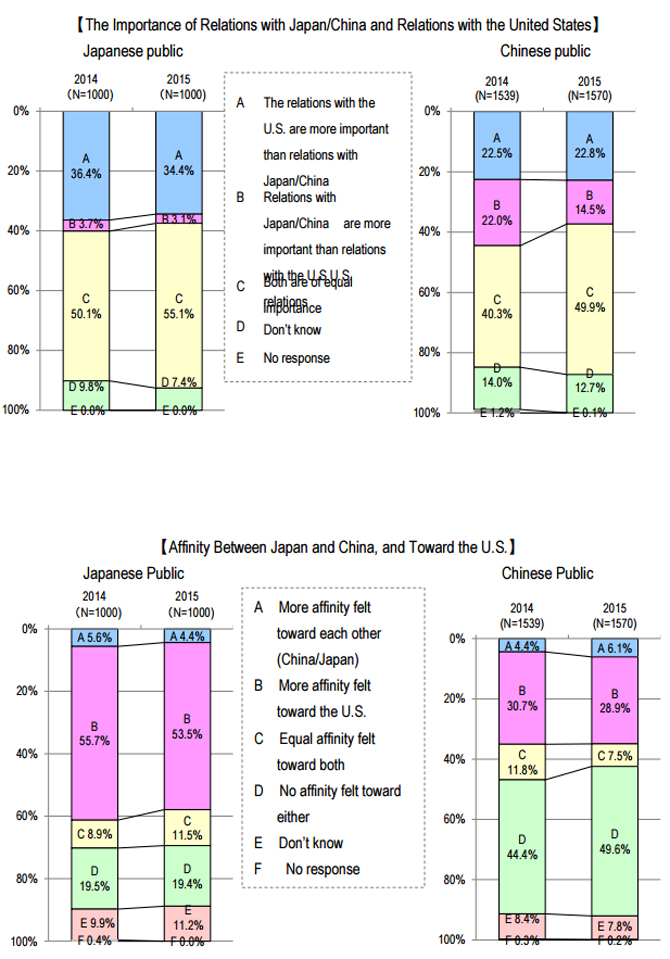
Importance of Japan-China Relations and Relations with South Korea and Affinity toward Respective Countries
When comparing the importance of Japan-China and Japan-South Korea relations, 54.3% (2014: 47.0%) of Japanese respondents replied that "both are equally important." The number of Japanese respondents who believe Japan-China relations are more important grew to 23.5% from 15.6% in the 2014 survey. In contrast, those who believe Japan-South Korea relations are more important came only to 6.3%, decreased from 12.4% a year before.
Although "Both are equally important" was most frequently cited by Chinese respondents, at 43.2% (2014: 43.5%), the reply that "China-South Korea relations are more important" (35.5%, 2014: 33.3%) came second, far surpassing 9.0% (2014: 6.5%), who see China-Japan relations are more important.
In a comparison of affinity toward each other's country among Japanese and Chinese respondents, and their respective affinity toward South Korea, the number of Japanese who feel greater affinity toward South Korea significantly declined to 26.3% from 37.2% in the 2014 survey. Japanese who feel more affinity toward China is only 8.8% (2014: 5.0%). The most common choice among Japanese respondents was that they feel no affinity toward either China or South Korea (39.5%, 2014 31.8%) .
For Chinese, those who feel more affinity toward South Korea have grown almost 10 percentage points to 62.1% from 52.7% a year earlier. Only 4.4% (2014: 3.5%) replied that they feel more affinity toward Japan.
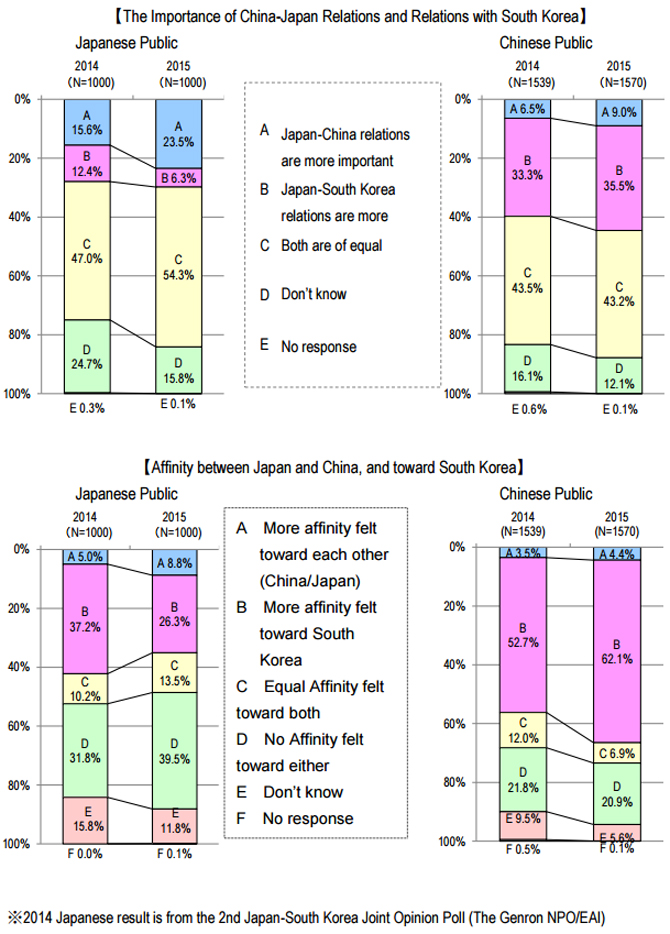

Issues that must be Discussed at Japan-China Summits
As to what agenda must be discussed at the next Japan-China summit, the most popular agenda among Japanese respondents is a "broad range of discussions toward improving relations between the two countries" with 43.6% (2014: 45.8%).
On the other hand, the most popular agenda for a summit among Chinese respondents is "the territorial dispute over the Senkaku/Diaoyu Islands" with 49.7% (2014: 49.2%). This is followed by "issues of historical understanding" with 38.3% (2014: 38.1%).
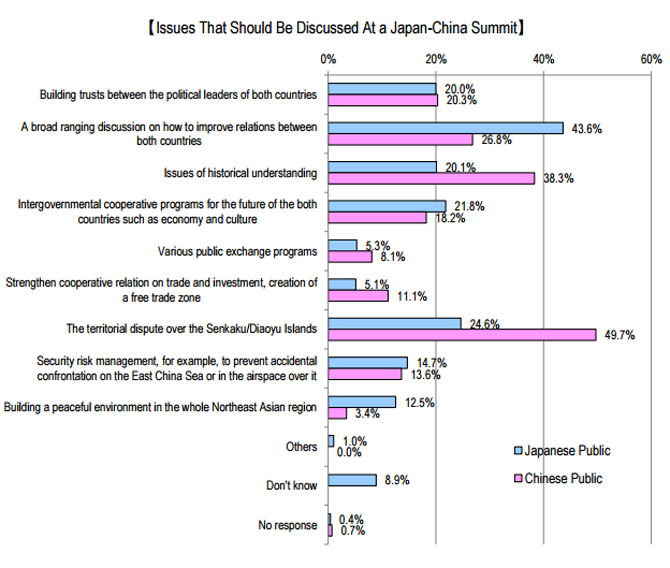

Views on the Japanese Prime Minister Shinzo Abe's Statement Issued on the 70th Anniversary of the End of WWII
Japanese respondents are divided in their views of Prime Minister Shinzo Abe's statement to commemorate the 70th anniversary of the end of WWII, issued on August 14, 2015. Those who believe that the statement was "satisfactory" (including "somewhat satisfactory") accounted for 32.1%. This surpassed 22.2% for those who consider the statement was "unsatisfactory" (including "not very satisfactory"). The reply "just can't say either" was 23.2% .
In contrast, 74.1% of the Chinese respondents regard that the prime minister's statement was "unsatisfactory" (including "not very satisfactory,") whereas favorable opinion toward the Abe statement ("satisfactory" and "somewhat satisfactory") were cited only by 9.5% of the Chinese respondents.
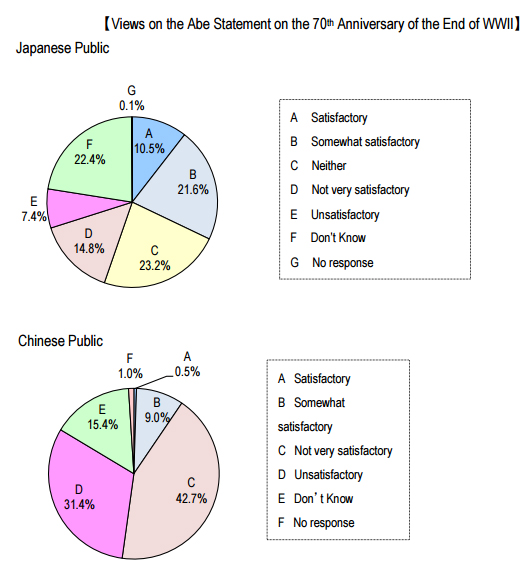

Views about Visits to Each Other's Country
Of the Japanese respondents, 32.9% answered that they "would like to visit China," a slight increase from 29.6% a year earlier. The percentage of Japanese respondents who "do not want to visit" China decreased to 67.0%, from 70.4% last year.
Chinese respondents who said that they "would like to visit Japan" accounted for 35.7%, a significant increase from 22.5% a year before. There is also a decrease in the percentage of Chinese who "do not want to visit" Japan (63.2%, 2014: 72.6%).
As reasons for Japanese people's desire to visit China, 69.0% of respondents said that they wish to visit "historical and cultural sites," while 66.9% of them said they want to visit" natural and sightseeing spots." These tourism-related reasons were prominent for Japanese respondents.
As for reasons why Chinese people want desire to visit Japan, as many as 88.0% of respondents replied that they wish to visit "natural and tourist spots" in Japan. One interesting finding was that 36.3% of the Chinese respondents mentioned shopping as a purpose for visit to Japan, which surpassed the corresponding figure of 16.4% for Japanese respondents who want to visit China for shopping.
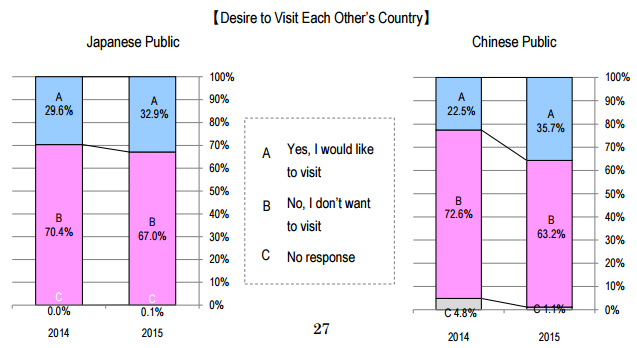
Views about People-To-People Exchange among Japanese and Chinese Peoples
Evaluations as to whether the current state of people-to-people exchanges are active, Japanese respondents are divided with 36.5% viewing the situation as "not active" (including "not very active") and 34.1% viewing the situation as "active" (including "somewhat active"). The reply "Don't know" accounted for29.1%. Similarly, Chinese respondents were divided over the current state of these exchanges, with 47.9% saying the exchange is "not active" and44.0% replying it is "active."
On the question of whether people-to-people and civil-sector exchanges would contribute to developing Japan-China relations, 67.1% (2014: 64.4%) of Japanese respondents see that people-to-people exchanges are "important" (including "relatively important"). The comparable figure on the part of Chinese respondents has grown by over 13 percentage points to 76.9% from 63.4% in the 2014 survey.
When asked about the reasons for the view that civil-sector exchanges are important, 71.7% (2014: 70.7%) of the Japanese said they create "Mutual understanding between the publics of the two countries" and 66.2% (2014: 66.8%) referred to "Deeper understanding of each other's country."
"Deeper understanding of each other's country" was most frequently cited on the part of Chinese respondents, with the percentage increased almost 20 percentage points to 51.9% from 32.3% a year before. In last year's survey, the largest number, 56.7%,of Chinese respondents noted that civil-sector exchanges will become "a base for expanding the common benefits for both countries." But the percentage declined in the latest survey to 43.3%.
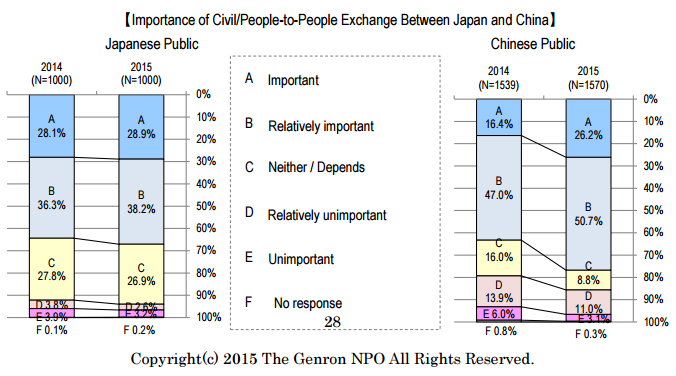

Implications of Historical Issues on the Japan-China Relations
As to Japan-China relations and historical issues between the two countries, the largest number of Japanese respondents noted that "it would be difficult to resolve the historical issues, regardless of situations in Japan-China relations" (35.3%), but there has been a decrease from 42.7% for last year. By contrast, 29.4% of the Japanese observed that "as relations between the two countries develop, the historical issues will be gradually resolved." This was an increase from 22.2% for the previous year, indicating an emergence of optimistic views in Japanese public opinion.
On the Chinese side, the percentage of those who believe that "China-Japan relations will not develop unless the historical issues are resolved" grew significantly to47.0% from 31.4% in 2014. Consequently, the optimistic view that "the historical issues will be gradually resolved as relations between Japan and China develop," which was the most frequently cited answer in last year's survey, decreased by 7 percentage points to 27.6% from 34.1% last year. Thus, unlike the optimism seen in Japanese opinion, more Chinese people are giving importance to solution of the historical issues.
As for historical issues that must be resolved between Japan and China, 56.1% (2014: 56.0%) of the Japanese respondents cited "China's anti-Japanese education and descriptions unfavorable to Japan in school textbooks. But Japan's view about its invasion of Asian countries in the wartime years was mentioned by 32.2% of the Japanese, up from 25.7% for last year, indicating that an increasing number of Japanese see Japan's attitude itself as a problem.
On the Chinese side, 56.2% of respondents noted that Japan should respect the established theory about its history of invasion in the wartime years, a sharp increase from 42.0% for last year. Further, 54.3% of the Chinese called for Japan's remorse and a serious apology over the history of invasion, as against 54.8% in last year's survey. Thus, issues related to Japan's wartime acts were frequently cited by Chinese respondents.
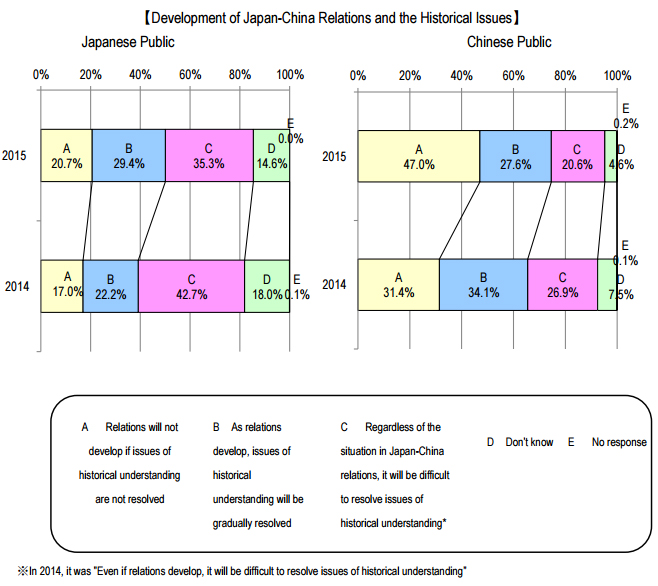
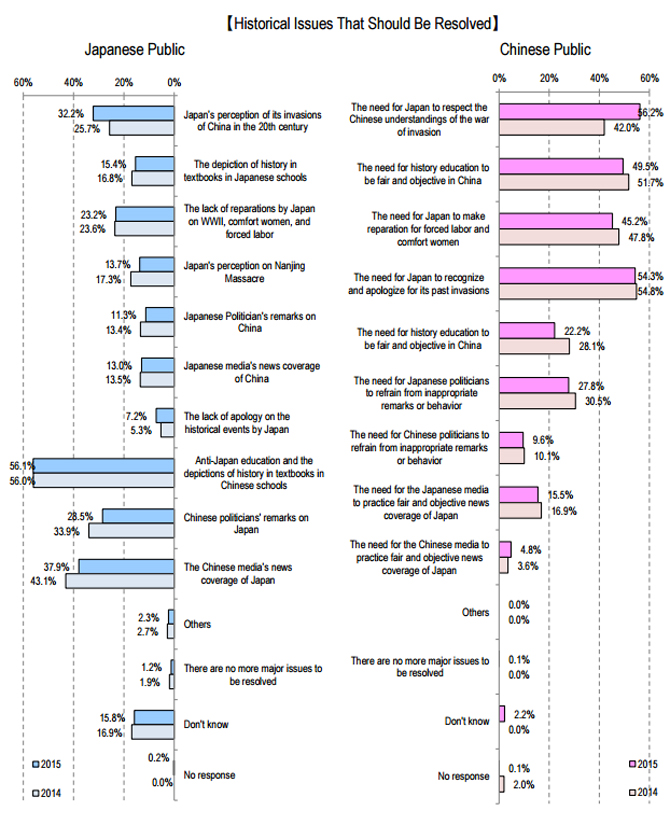
Japanese Prime Ministers' Visits to Yasukuni Shrine
A large majority of Japanese public see a prime minister's visit to Yasukuni Shrine as acceptable. When combined, close to 70% of Japanese respondents express their acceptance of the prime minister's visit to Yasukuni Shrine (including "if the visit is made as private citizen). That said, the percentage of Japanese respondents who see that the prime minister's official visit to the shrine is acceptable has declined from 47.7% (2014) to 33.5%.
In contrast, 60.2% (2014: 59.5%) of the Chinese maintain that the Japanese prime minister should not visit the shrine, regardless of if it was in an official capacity or as a private citizen.
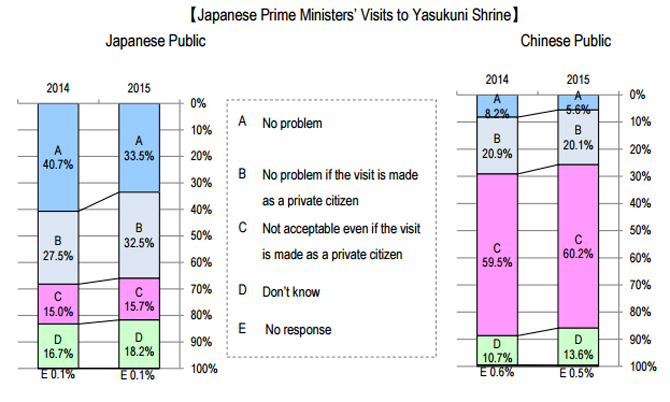

Senkaku/Diaoyu Islands and Territorial Dispute
The largest number of Japanese respondents (46.2%, 2014: 48.4%) called on "both countries to promptly proceed toward negotiations in order to resolve their issues through peaceful means," as was the case with last year.
In contrast, 58.2% of Chinese respondents maintained that "China should strengthen its effective control over the area in order to protect the territory." While showing the 5 percentage point decrease from 63.7% (2014), this was still the most frequently cited answer by the Chinese. The number of respondents who hope that "both countries should promptly proceed toward negotiations in order to resolve their issues through peaceful means" has increased over 10 percentage points from 32.6% in last year's survey to 43.6% this year.
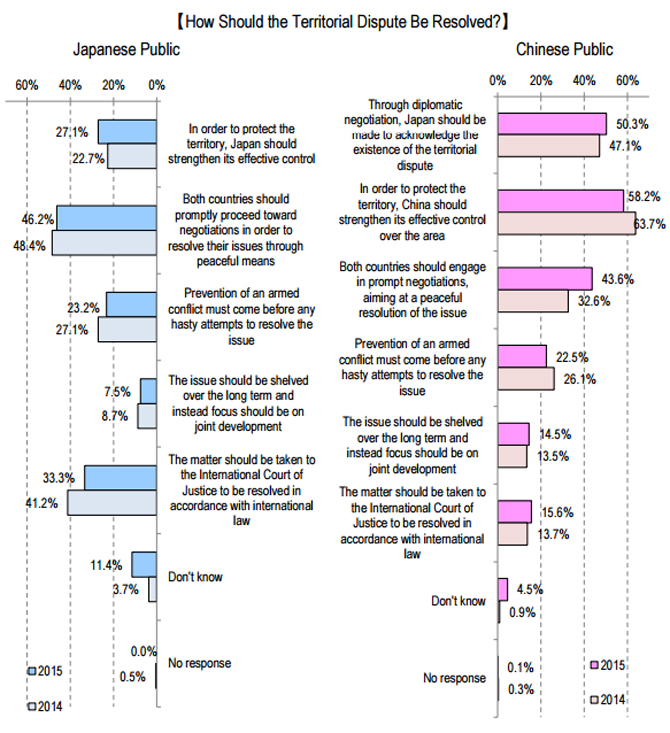
The Possibility of Military Conflict between Japan and China over Territorial Issues
Regarding the possibility of a military conflict between the two countries following their rivalry over the Senkaku/Diaoyu Islands, the largest number, 38.8% (2014: 38.0%), among Japanese respondents took a view that such a conflict is not likely, as was the case for last year. Still, the 34.2% (2014: 32.9%) of Japanese are unsure as they selected "Don't know." Those who expect a military conflict to occur "in the future" or "in a few years' time" accounted for 26.9% (2014: 29.0%).
On the Chinese side, 41.3% of the respondents foresee a military conflict occurring "in the future" or "in a few years' time" combined. showing a decline by 12 percentage points from 53.4% in the 2014 survey. Conversely, those who expect no military conflict have increased 12 percentage points to 39.2% from 27.4% for last year.
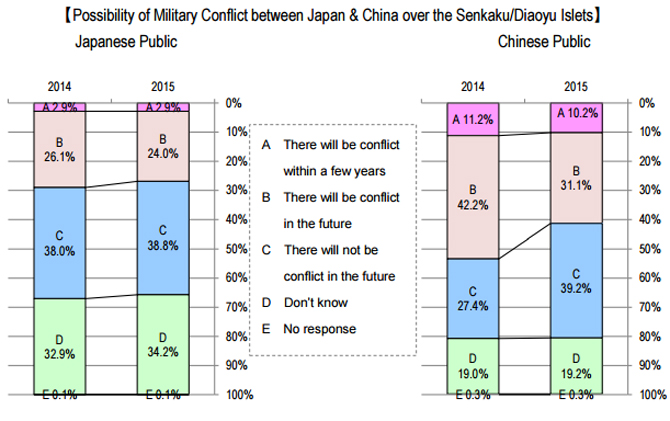
Perception on Military Threats
The survey found that 68.3% of the Japanese respondents believe there is a country or a region that can be regarded as a military threat to Japan. A comparable figure for Chinese respondents was 60.3%.
An additional question was posed to those respondents who replied there is a military threat to their country. They were asked to specify countries or regions from which they feel military threats. Among Japanese respondents, the most frequently cited country was North Korea with 75.0%. This was followed by China with 68.1%. These two countries far surpassed other answers.
The largest number of Chinese respondents (81.8%) cited Japan as a military threat. This was more than those who feel military threats from the U.S. (73.8%), which was the most frequently cited country last year. Due to the change in survey questions and structure this year, a simple comparison cannot be made, but the last year's figure for Japan was 55.2% and the U.S. was 57.8% as the question was asked to every respondents, not limited those who .answered that there is a country poses military threats to their countries.
Japanese respondents who feel military threats from China were asked the reasons why they hold such views. The largest number, 72.5%, cited this is due to the fact that "Chinese vessels' repeatedly intruding into Japan's territorial waters around the disputed islands." Second most frequent answer was "the existence of disputes over the Senkaku/Diaoyu Islands and undersea resources between the two countries" (61.7%). A noticeable increase was seen for the answer that "Chinese military power is already strong," up about 10 percentage points to 41.3% from 31.9% a year earlier.
Chinese respondents who feel a military threat from Japan were asked about the reasons for their view. The largest number, 64.1%, maintained that "Japan has contained China militarily in cooperation with the U.S." Those who mentioned Japan's recent passage of a series of laws enabling it to exercise the right to collective self-defense, when necessary, accounted for only 13.2%.
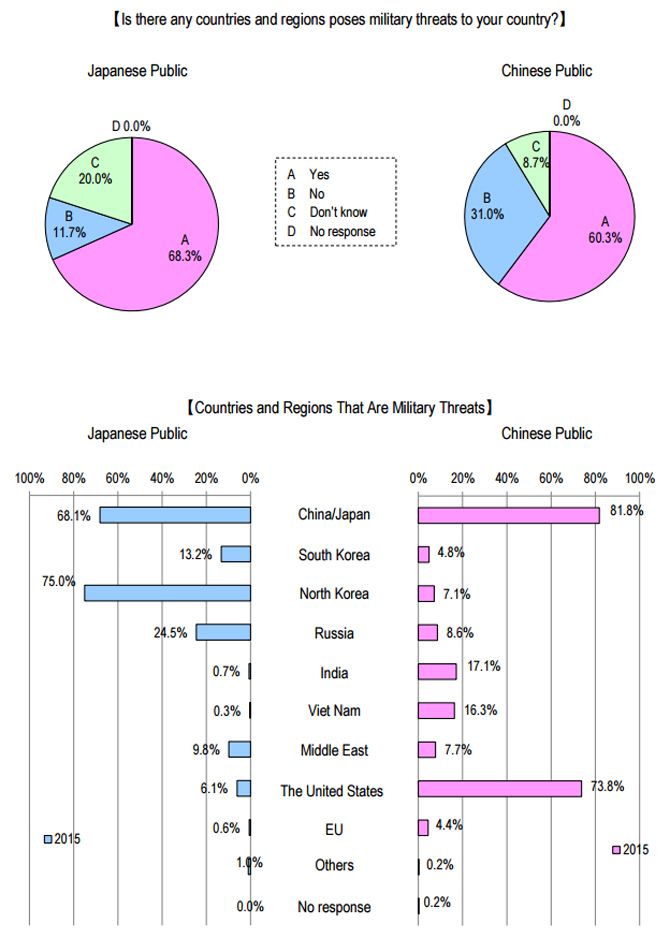

Japan-China Economic Relations
Asked about economic relations between Japan and China, the largest percentage of Japanese respondents observed that it will be "difficult" (including "relatively difficult") to build "win-win" relationships because the Japanese and Chinese economies are in competition. This was the same as in last year's survey, but the percentage was down to 38.0% from 47.1% a year ago. In the meantime, the percentage of those who think that "win-win" relationships can be built (including "relatively think so") because the two countries' economies are mutually complementary grew to 27.7% from 20.1% a year ago.
Conversely, 51.1% of Chinese respondents observed that "win-win" relationships can be built because the two countries' economies are mutually complementary. This was the most frequently cited answer, but the percentage fell from 62.8% for last year. By contrast, those who believe that it will be difficult to build "win-win" relationships between the two countries increased to 43.3% from 28.7% a year earlier.
On the course of economic and trade relations between Japan and China, 41.9% of Japanese respondents replied that their economic and trade relations will shrink ("significantly" and "slightly" combined) from now on. The view that there will be no change was supported by 18.1% of the respondents. When combined, 60.0% of the Japanese foresaw no improvement in the current chilly situation in the immediate future.
On the Chinese side, 43.5% of the respondents expected that economic and trade relations will shrink while 27.8% of them foresaw no change in the current situation. When combined, 71.3% of the Chinese saw no bright prospects for the future of economic and trade relations between the two countries.
About what must be done to develop economic and trade relations between Japan and China, 62.9% of the Japanese and 50.3% of the Chinese cited an improvement in intergovernmental relations between the two countries. Thus, the two countries' peoples equally believe that betterment of relations between the Japanese and Chinese governments is the foremost challenge facing the two countries. Among Chinese respondents, 31.9% replied that steady efforts should be made to strengthen economic activities by private businesses.
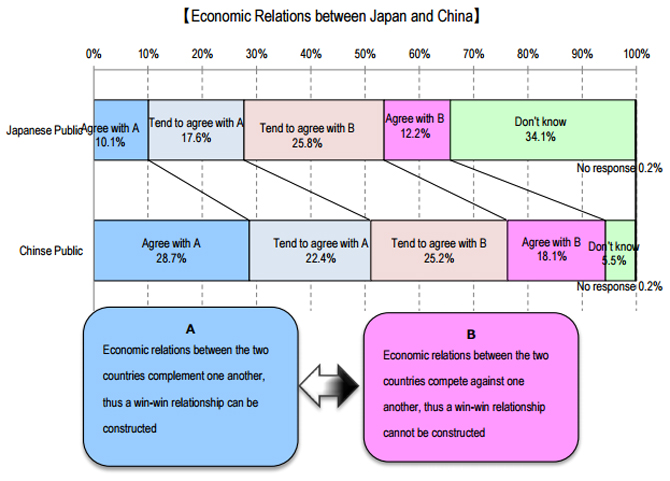
The Advisability of Japan's Role in AIIB and the Framework of Economic Partnership in East Asia
As to the advisability of Japan's participation in the AIIB, the most common answer among Japanese respondents was "just can't say either way" with 39.3%. Those who are satisfied with Japan's decision to refrain from the undertaking accounted for 31.9%, far surpassing 3.9% for those who replied to the contrary.
The most common answer among Chinese respondents was that "Japan's should not have joined" with 33.9%, whereas 23.8% of them replied that "Japan should have participated" in the bank. The 31.5% of Chinese respondents said that they "have not heard about the AIIB."
Asked about what kind of a framework is necessary for economic cooperation for the future of Japan, 50.3% of Japanese respondents are unsure about which framework is necessary, only responded that they "don't know".
On the Chinese side, about 30% of respondents supported the Regional Comprehensive Economic Partnership, the Trans-Pacific Partnership and a free-trade agreement between Japan, China and South Korea as desirable frameworks for economic cooperation. The RCEP was favored by 35.5% of the Chinese, TPP by 33.9% and the trilateral trade agreement by 34.0%.
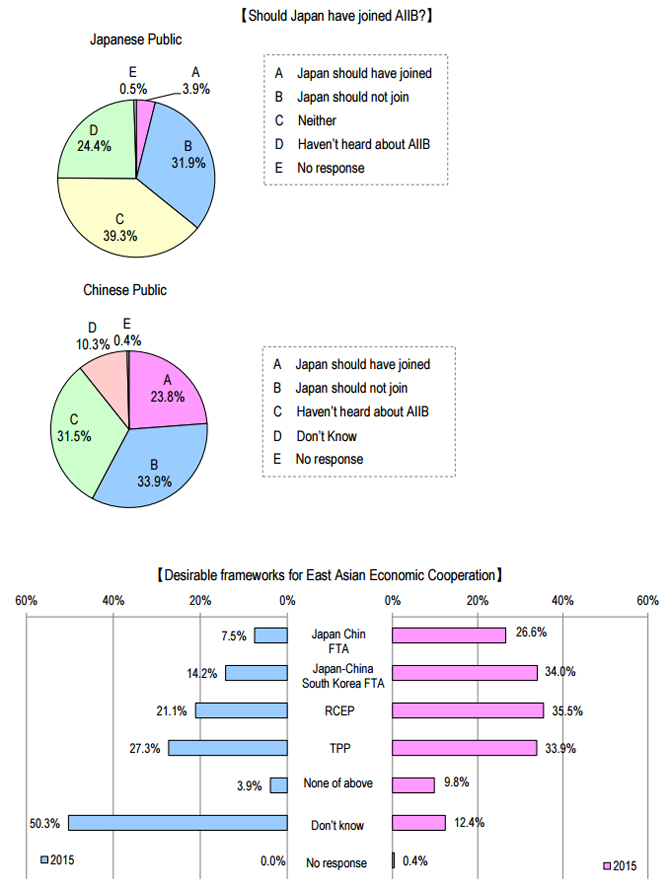

Is Coexistence/Co-prosperity Possible Between Japan and China?
Around half of respondents on both sides, 58.0% of Japanese and 46.7% of Chinese, pin hopes on peaceful coexistence/prosperity relations between Japan and China, but they are not confident that such relations can be truly realized. Comparable figures in last year's survey were 54.6% for Japanese respondents and 50.3% for Chinese respondents. The view that peaceful coexistence/prosperity relations can be realized was favored by only 19.4% of the Chinese (2014: 16.5%) and 8.2% of the Japanese (2014: 7.8%). The answer that the current tough relations between the two countries will continue was cited by 19.6% of the Japanese (2014: 17.3%) and 24.8% of the Japanese (2014: 20.7%).
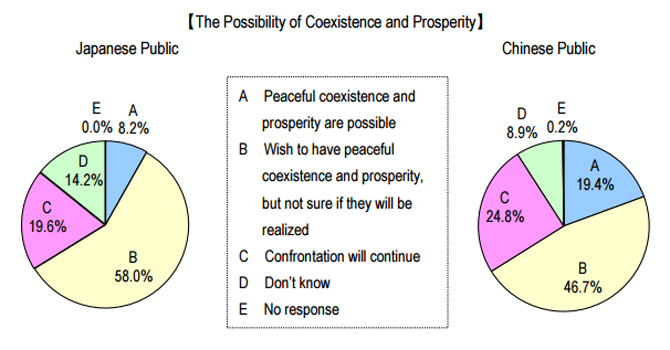
Expectations for Cooperative Relations between Japan and China
The survey found that 64.4% of Japanese respondents and 54.3% of Chinese respondents are "in favor" (including "relatively in favor") of the view that Japan and China should work together toward resolving challenges between the two countries, and those facing Asia. Comparable figures in last year's survey were 66.1% for Japanese respondents and 52.2% for Chinese respondents. But 29.3% of Chinese respondents replied that they "disagree" (including "relatively disagree"), as against 33.5% for last year.
As specific areas of cooperation, the largest number, 67.7%, among Japanese respondents cited environmental issues, including air pollution (85.6% last year). Three other fields were also mentioned by more than 40% of respondents: North Korea's nuclear development was cited by 50.9% (67.3% last year), security in food by 46.4% (80.2% last year) and the maintenance of peace in Northeast Asia by 39.8% (59.6% last year). The findings indicated Japanese people's interest in cooperation with China for specific issues. Alternatives that showed a noticeable increase included tourism, which was cited by 29.3% of the Japanese respondents, up from 18.5% a year ago.
For the Chinese, the most frequently cited answer was the maintenance of peace in Northeast Asia, but the percentage remained below 40%, standing at 37.3% (2014: 37.8%). Two other alternatives were also cited by over 30% of respondents: the strengthening of cooperative relations in such fields as trade and investment, and formation of free-trade zones was referred to by 35.1% (2014: 29.1%) while 30.7% of respondents called for cooperation in energy-saving technology and recyclable energy sources, including wind power and solar power generation (2014: 28.6%). Just like the findings on the Japanese side, a significant increase was seen in the percentage of respondents citing tourism, which doubled from 8.3% to 17.0%.
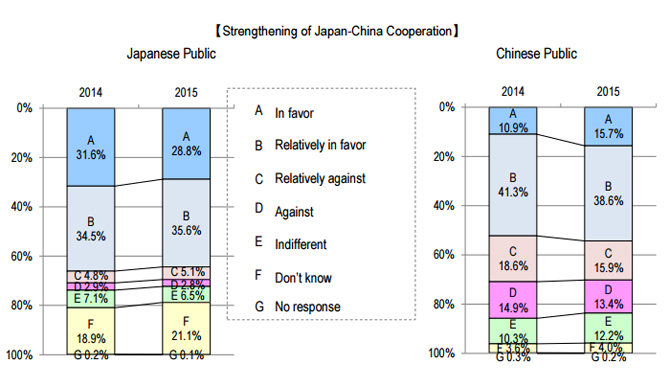

How will Japan and China's Influence Change in Asia in the Next 10 Years?
When asked whether Japan's clout in the political, economic, military and cultural fields in Asia will change in the next 10 years, the largest percentage of Japanese respondents replied that they foresee no change. Respondents on the Chinese side rather expect Japan's influence to become larger in the military and economic fields.
On questions about possible changes in China's influence, Japanese respondents expect no change in China's cultural influence. But its influence in all other fields was expected to become larger. Chinese respondents expect China's influence to become larger in all four fields.
When asked about Japan's political influence in Asia in the next 10 years, the largest number (45.1%) of Japanese respondents expect no change, while 23.2% of them see that the political influence "will increase" (including "will increase to some extent") and 15.0% of them expect the political influence to "decrease" (including "will decrease to some extent"). On the Chinese side, 38.9% of respondents think the Japan's political influence will become larger while 35.5% of them expect the influence to remain at the current level.
On Japan's economic influence, the largest number (34.9%) among Japanese respondents expect Japan's economic influence to remain at the present level while those who expect the influence to increase was 30.7%. Turning to the Chinese result, 39.8% of Chinese respondents expect the influence to become larger, surpassing 33.4% for those who foresee no change.
The Japanese and Chinese opinion on Japanese military influence shows the biggest contrast. The view that the Japan's military influence to be at the current level was the most common opinion of Japanese respondents (46.4%). 23.0% of the Japanese see the influence will increase and only 11.3% of the Japanese respondents expect it to decrease. On the Chinese side, 46.0% of respondents expect Japan's military influence to become larger, outdoing corresponding figures for their views about the future of Japan's influence in three other fields. The answer "no change" accounted for 33.6% while 17.2% of Chinese respondents expect Japan's military influence to become smaller.
Finally, on cultural influence, the largest number, 46.2%, among Japanese respondents foresaw no change in Japan's cultural influence. 34.8% expect the influence to become larger. A scarce 4.2% of Japanese expect the Japanese cultural influence to become smaller. On the part of Chinese, the largest number, 43.1%, foresaw no change, followed by 31.8% for those who expect the influence to become larger.
Now, turning to Chinese influence, as to the course of China's political influence in the next 10 years, 52.0% of Japanese respondents expect the influence to become larger. A similar expectation was aired by an even loftier 88.7% of respondents on the Chinese side.
China's economic influence was expected to become larger by 48.1% of Japanese respondents. The percentage of Chinese respondents who foresee the country's economic influence becoming larger came to 84.7%.
Of Japanese respondents, 64.2% expect China's military influence to become larger, surpassing comparable figures for Japanese who expect expansion for China's influence in the three other fields. Of Chinese respondents, 84.1% expect the military influence to become larger.
Finally, China's cultural influence was expected to be unchanged by 52.1% of Japanese respondents. Those who expect the influence to become larger accounted for only 17.8%. The number of Chinese respondents who expect the cultural influence to become larger came to as many as 74.3%, but this was down about 10 percentage points, when compared to figures for expectations of a larger influence in other fields.
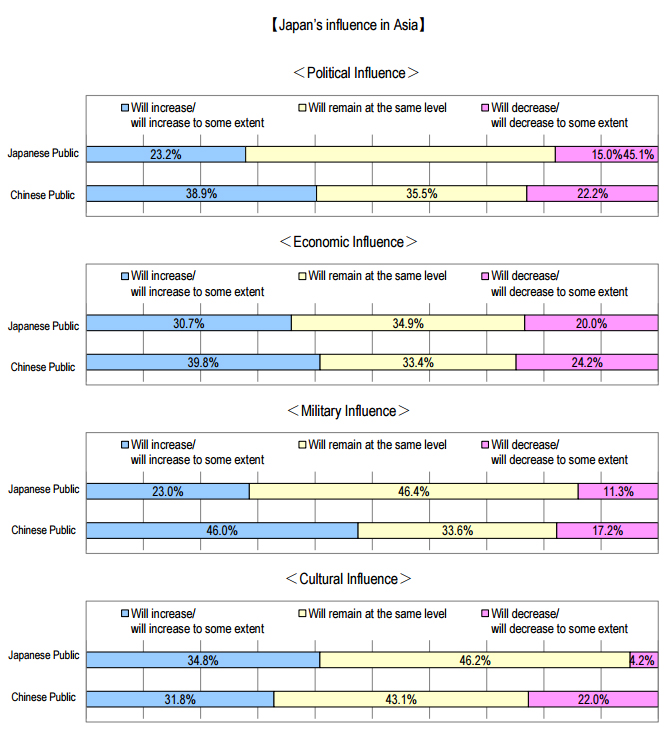
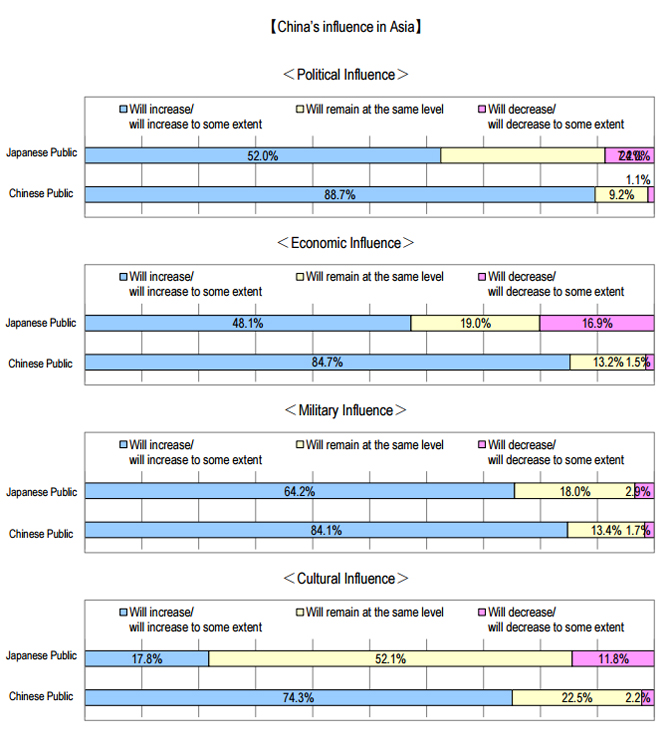

The Most Important Values that must be Pursued in East Asia
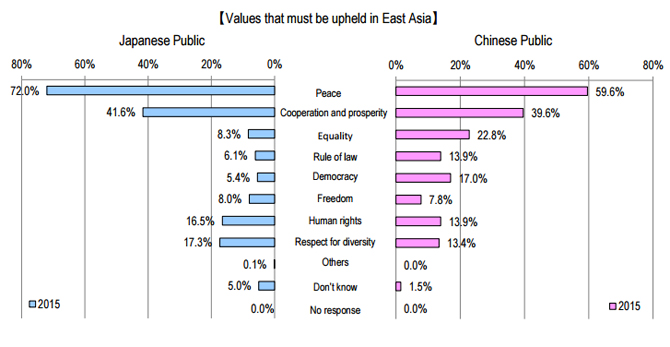

Japan-China Relations and the Media Environment in Japan and China
As to whether media coverage in China contributes to improving Japan-China relations, and promoting mutual understanding between the Japanese and Chinese publics, 73.2% of Chinese respondents replied that the Chinese media is "very" or "somewhat contributory," indicating a high level of satisfaction among Chinese toward their country's media coverage of Japan and Japan-China relations.
Conversely, favorable view of Japanese media coverage were expressed only by 33.1% of the Japanese respondents. The reply that the Japanese media coverage is rather adversely affecting the situation came to 14.4%.
The percentage of Chinese respondents who observe the Chinese media coverage about Japan-China relations as objective and impartial remained high at 75.9% (2014: 73.9%).
The majority (50.3%,2014: 42.4%) of Japanese respondents replied they "don't know" if the Japanese media coverage of Japan-China relations is objective and impartial. Those who feel the Japanese media coverage is objective and impartial came only to 19.5%, down from 26.8% last year. 30.1% (30.5%) of the Japanese respondents do not think the Japanese media coverage is objective or impartial.
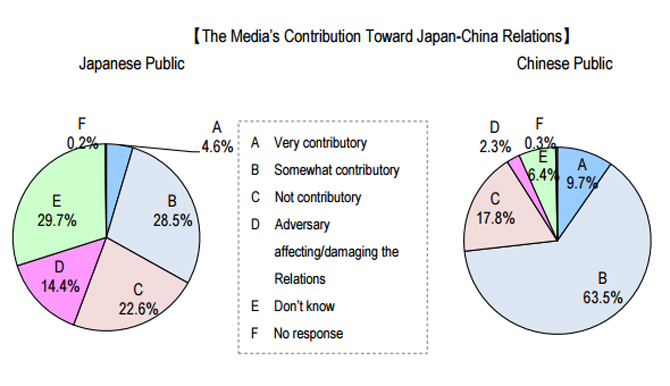
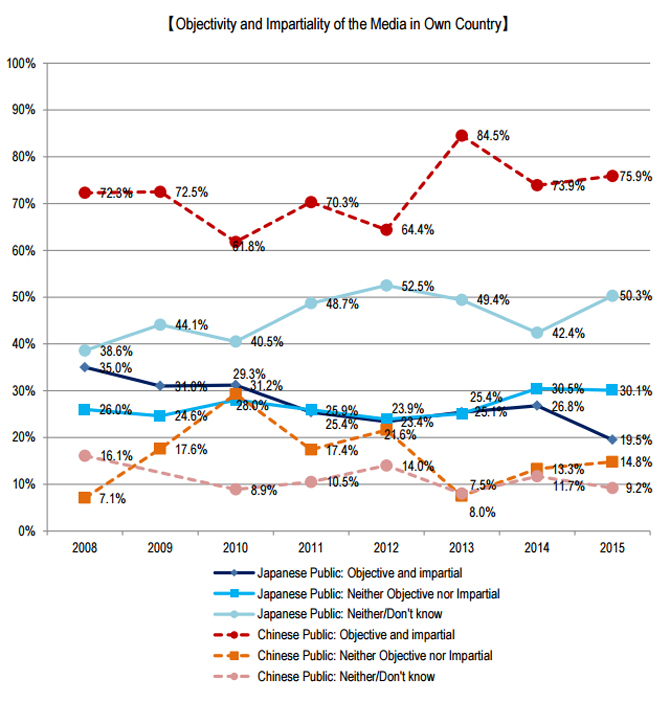
Does Opinions on the Internet Represent General Public's Views?
The largest number (40%) of Japanese respondents doubt that opinions on the Internet "appropriately reflect" the general public's views representatively. Conversely, over 80% of Chinese respondents believe the opinion on the Internet "properly reflects" the people's view in China.
Of the Japanese respondents, 38.9% of them view public opinion on the Internet as not appropriately reflecting people's views. Those who believe the opinion on the Internet "appropriately reflects" (including "basically reflects") the people's view came to 29.5%. On the Chinese side, the large majority (84.4%) of the respondents believe that the opinion on the Internet "appropriately reflects" the people's view.
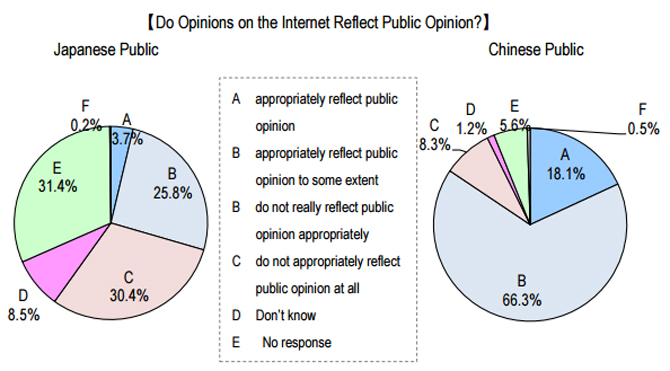

The Degree of Direct Interaction between Japanese and Chinese Publics
The number of Japanese respondents who have visited China came to 15.1% (2014: 14.3%). Those who have "close friends" in China or "Chinese friends with whom they can converse with" came to 19.2% (2014: 21.1%). There were no major changes from last year in these results.
On the question of information source on China, as many as 95.8% (2014: 96.5%) of the Japanese respondents depend on Japanese media coverage of China and Japan-China relations as a major information source. The large majority (75.8%, 2014: 76.1%) cite TV as their main source of information. This pattern also remained the same from last year.
On the Chinese side, 7.9% of the respondents replied they have visited Japan, an slight increase from 6.4% (2014). The percentage of Chinese who have "close friends" in Japan or "Japanese acquaintances with whom they can converse with" grew to 7.3% from 3.1% in the 2014 survey.
Japan-related information sources are diversifying among Chinese people. Although Chinese media coverage was cited by 89.6% (2014: 91.4%) of the Chinese respondents, 57.6% of them receive information from Chinese TV dramas, information programs and films (2014: 61.4%), 30.1% (2014: 37.4%) from Chinese books (including textbooks) 15.7% (2014:14.3%) from Japanese media reports. Chinese also use the Internet and SNS sites as sources of information more actively than Japanese.
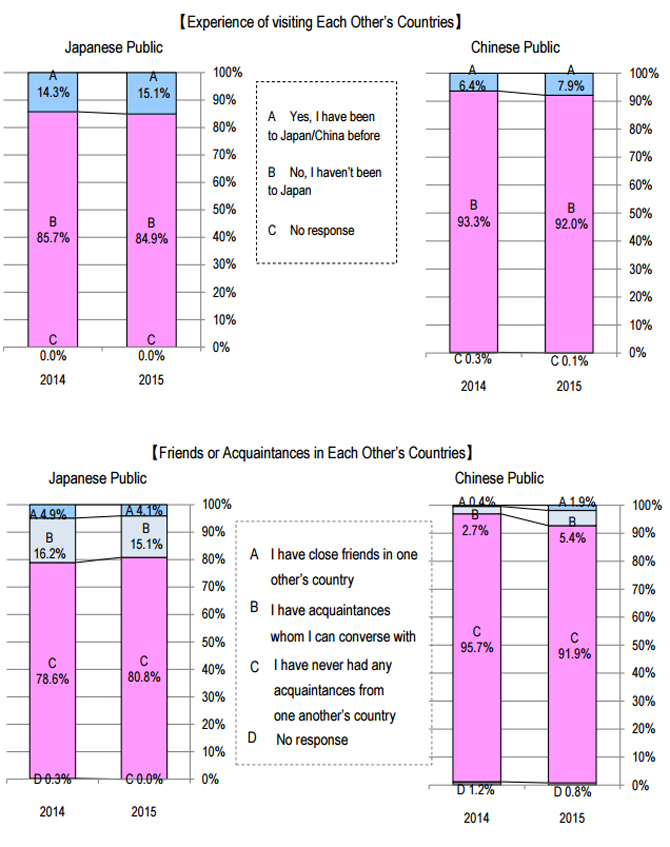
Registered Non-profit Organization The Genron NPO
1-20-7 Nihonbashi, Chuo-ku, Tokyo Japan 103-0027
email:info@genron-npo.net

Post a comment